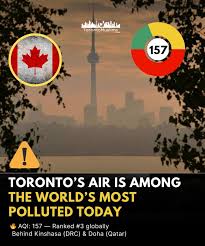
Introduction
The air quality in Toronto is a growing concern for residents and policymakers alike. With increasing urbanization and industrial activity, the importance of monitoring air quality has never been more critical. Poor air quality can significantly affect health, lead to respiratory diseases, and impact the overall quality of life for city inhabitants.
Current Air Quality Trends
As of October 2023, real-time data from Environment Canada indicates fluctuating air quality levels across Toronto, particularly in industrial areas and during peak traffic hours. According to the city’s Air Quality Health Index (AQHI), several locations within Toronto are experiencing moderate to high levels of pollution, primarily due to vehicle emissions and construction activities. Recent reports suggest that the worst air quality days often coincide with weather conditions such as stagnation, which prevents pollutants from dispersing.
Health Implications
The implications for public health are significant. A report by the Toronto Public Health department noted that high pollution days can lead to increased hospital admissions for cardiovascular and respiratory issues, particularly among vulnerable populations, including children and the elderly. Health experts advocate for enhanced public awareness and recommend that people limit outdoor activities on days when pollution levels are elevated.
Government Initiatives
The City of Toronto has initiated several programs to improve air quality, including the Electric Vehicle (EV) program to encourage the use of electric cars and a Clean Air Strategy aimed at reducing emissions from transportation and industry. The city also supports tree planting and green space initiatives to enhance urban forestry, which plays a vital role in filtering air pollutants.
Community Engagement
Community engagement plays a pivotal role in addressing air quality issues. Local organizations and advocacy groups are actively working to educate residents about the sources of air pollution and ways to minimize exposure. The city has organized workshops and public forums to discuss air quality challenges and invite civic participation in finding solutions.
Conclusion
In conclusion, air quality in Toronto is a crucial topic that affects every resident. The ongoing challenges posed by pollution require collective efforts from both government and community members. With continued investment in green initiatives and public health education, Toronto can aspire to achieve better air quality standards that safeguard the health and well-being of its residents. The future of Toronto’s air quality depends on proactive measures and community involvement, highlighting the significance of this issue for all of us.



